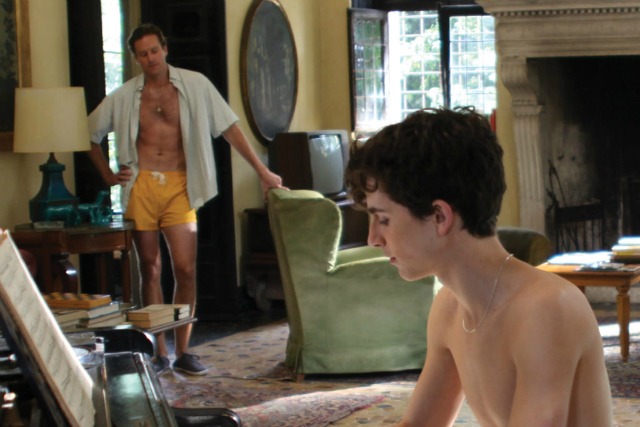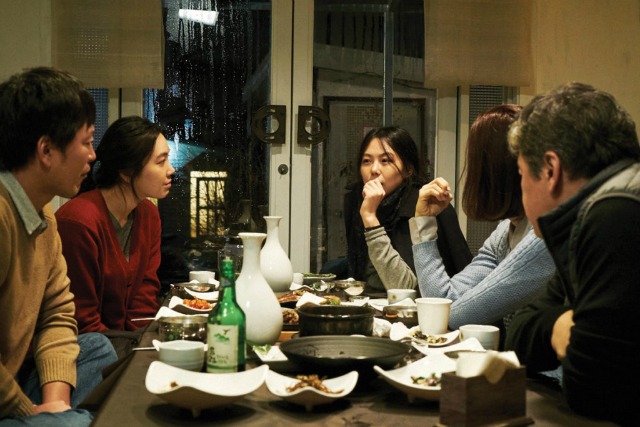6 Must-Sees At The Chicago International Film Festival's Week 2
By Chicagoist_Guest in Arts & Entertainment on Oct 19, 2017 2:44PM

"Call Me By Your Name"
By Scott Pfeiffer and Jacob Oller
With the 53rd Chicago International Festival headed into its second week, it’s time for our mid-fest report. The remaining program offers many enticing prospects, including Dee Rees’s Mudbound, adapted from Hillary Jordan’s shattering novel. We can also recommend Shorts 8—These Walls Talk: Architecture, featuring Standing Nymph and Man, a visionary exploration of Chicago’s Fine Arts Building. You can still catch some of our 10 pre-fest picks, as well.
We’d especially encourage you not to miss the Kartemquin Films show, "Can’t Turn Back" (Oct. 22), a program of two stirring half-hour documentaries. The heartbreaking Edith & Eddie is about the titular couple, 90-something interracial newlyweds. Gordon Quinn’s ’63 Boycott remembers the October 22, 1963 Chicago Public School Boycott in light of the struggles around education today. It’s a film every Chicagoan should see.
It’s possible to discover treasures simply by opening the CIFF schedule and putting your finger down. But if you’d like some informed tips on what to see and what to miss, well, that’s why we’re here.
SEE IT
Call Me By Your Name (Oct. 25) A sumptuous poem about love and loss over the course of a summer, Luca Guadagnino's Call Me By Your Name uses confident performances from Armie Hammer and Timothée Chalamet to supplement its bright, warm color palette. The writing is sparse, allowing you to lose yourself in the Italian countryside and the small, intense romance blooming onscreen. Sometimes achingly slow, the film’s love of music—including collaborations between Sufjan Stevens and Sryuichi Sakamoto—keeps things moving when the romance hiccups and creaks. — Jacob Oller
Tokyo Vampire Hotel (Oct. 21) This miniseries, recut into a film that condenses a mad, legend-spanning narrative of global high-class vampire dominance spun by idiosyncratic writer/director Sion Sono, is utter chaos. Sono is known to be subversive and strange among Japanese filmmakers, who are already working with a much different set of expectations than Hollywood directors. That this movie even holds together through its amusement park amounts of energy is a marvel, but it often manages to find glimpses of humor and Tarantino levels of epic (and epically bloody) genre fare that are almost as crazy as this movie thinks it is. — Jacob Oller
El Mar La Mar (Oct. 24 & 25): Northwestern University professor J.P. Sniadecki (The Iron Ministry) and Joshua Bonnetta created this sensory, spooky experience on distressed 16mm shot in the wilderness of the Sonoran desert, a vast, boiling killing floor where thousands have died, or disappeared, trying to cross the U.S./Mexico border. El Mar La Mar is a boundary-challenging documentary in more than one sense, a gorgeous experimental film set often in the gloaming, and touching on themes of politics, culture and nature. At times, we simply hear personal stories from survivors, border patrol agents, farmers, and hikers told over a black screen; at such moments, we project their scarifying visions in our minds. The film thus taps into our imagination to look at the refugee crisis in our own backyard, while also evoking the "adventure of perception" that Stan Brakhage called for. — Scott Pfeiffer
Golden Years (Oct. 19 & 22): This passionate, moving film by French master André Téchiné (Wild Reeds, Strayed) tells the true story of Paul Grappe (Pierre Deladonchamps of Stranger by the Lake), a deserter from WWI whose wife Louise (Céline Sallette) convinces, over his strenuous demurrals, to disguise himself by crossdressing. To his surprise, being "Suzanne" liberates him; in those happy, heroic days, gender becomes for him a fluid, tangled form of playacting. Together, Paul and Louise embrace the swinging life, until he unravels in the flush of post-amnesty fame. (Starring in a cabaret biography only makes him feel like a sideshow act.) The psychology is somewhat muddled—we never fully understand Louise's point of view, or Grappe's demons. Yet Téchiné's sumptuous mise en scène, rich in color and texture, vividly evokes the demimonde of Roaring Twenties Paris, its fervid embraces and golden costumes like a Klimt painting come to life. — Scott Pfeiffer
On the Beach at Night Alone (Oct. 24 & 25): Hong Sang-soo's honest, playfully self-lacerating film features a delightfully knowing and poignant performance from Kim Min-hee (The Handmaiden; Right Now, Wrong Then). In chapter one, she plays an actress lying low in Hamburg after a scandal back home over her affair with a married director, much like the one she and Hong had in real life; in chapter two, she's back in South Korea, facing old friends (including the director). Hong has been called the Korean Woody Allen or Eric Rohmer, and this film is another dreamy, insightful comedy of manners about communication breakdown between neurotic men and women. His hallmarks are here: extended takes with punctuating zooms and pans, soju-fueled declarations of truth and love, the roguish blend of reality and fantasy. There's even a moment or two when you won't be sure exactly what you've just seen. — Scott Pfeiffer

"On the Beach at Night Alone"
Western (Oct. 21 & 22): This nuanced drama features remarkably organic performances from a non-professional cast. It patiently examines a crew of imperious Germans working to build water infrastructure for a village in southern Bulgaria, which they condescendingly regard as a backwater, particularly the bumbling, bullying team captain (Reinhardt Wetrek). Only the film's hero (Meinhard Neumann) treats the local people and customs with respect, bonding with a serene, stoic native (Syuleyman Alilov Letifov) with whom he communicates, movingly, through gesture and broken English. Writer/director Valeska Grisebach (Longing) deftly plays with the tropes of the titular genre—most poignantly a white horse—making them an allegory for today's European Union. The story builds almost imperceptibly into a profile in irony—the Western man in Eastern Europe, whose good intentions can't keep him from getting in over his head. — Scott Pfeiffer
SKIP IT
Control (Oct. 23): This generic crime drama, the latest to feature Flemish detectives Vincke and Verstuyft of the Jef Geeraerts novels, is diverting enough, but offers nothing you couldn't get from staying home and watching a good episode of Criminal Minds. From the dynamic of the cops (by-the-books vs. renegade), to the rooftop chases, to that scene where detectives watch helplessly after inadvertently triggering a computer to auto-delete all their main suspect's incriminating files, you've seen all of this before. Even the unpredictable bits are somehow predictable. That said, if you've been to Belgium, you may enjoy the glimpses of windmills. — Scott Pfeiffer